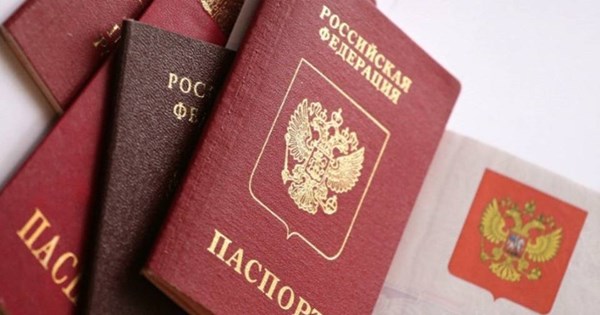Russia to make it easier for Donbas residents to obtain Russian citizenship
The Russian government intends to make it easier for inhabitants of the so-called Donetsk and Luhansk People’s Republics (DPR and LPR) to obtain Russian citizenship, Kommersant reports, citing sources in the Russian government.
According to the sources, everything has been worked out, and all that remains is for Russian President Vladimir Putin to sign the relevant decree. This could be done immediately after the presidential elections in Ukraine.
“What other options are there? The people have nowhere to go, and the conflict resolution is deadlocked,” one of the sources remarked.
Leonid Kalashnikov, chairperson of the Russian parliamentary committee on CIS affairs, confirmed to Kommersant that “such a decree could be signed immediately after the elections… unless it becomes somehow politically expedient to see how a new Ukrainian president, if there is one, does or does not do something to resolve the situation in eastern Ukraine”.
Kalashnikov pointed out that Russian parliament has passed a law which allows the president to determine the categories of foreigners that can obtain Russian citizenship through a simplified procedure. “We have freed the president’s hands,” he said. “I think that the Ukrainian elections are still keeping him from taking this step.”
When asked whether Luhansk had been contacted by Moscow concerning the passport procedure, LPR “Foreign Minister” Vladislav Deynego responded: “This matter is not public. I will not comment. Changes [to Russian legislation] have been made and have come into force. I cannot say any more.”
Kommersant claims to have information that infrastructure for receiving new citizens has already been established in the Russian regions that share a border with the Donbas.
High-ranking Interior Ministry officials visited Russia’s Rostov province in March. A new branch of the General Administration for Migration Issues was opened in Rostov-on-Don on 16 March. Similar preparations have reportedly been made in other settlements, including the cities of Shakhty and Novoshakhtinsk.
Moscow began making forced changes to the legislation concerning migration and the granting of Russian citizenship at the start of 2018. All related matters are overseen by the Presidential Office for Protection of Citizens’ Constitutional Rights, which is led by former justice minister Maxim Travnikov. It was Travnikov’s administration that proposed the country’s new migration policy that was approved by Putin on 31 October 2018.
This year the Kremlin finished establishing the institutional infrastructure necessary to absorb a large number of immigrants from neighboring countries. On 6 March, Putin established a 24-person work group to implement to plan. The group includes officials from various ministries, departments and the State Duma, and is led by Maxim Travnikov.
The work group had its first session on 12 April. Six subgroups were established, including a subgroups for migration and citizenship, for the issuance of electronic entry visas, and for labor migration problems. Sources informed Kommersant that the goal of the migration operations is to absorb 5-10 million migrants. The envisaged donor countries are the neighboring states with a large number of Russian speakers, including Ukraine, Kazakhstan, Uzbekistan and Moldova.
